|
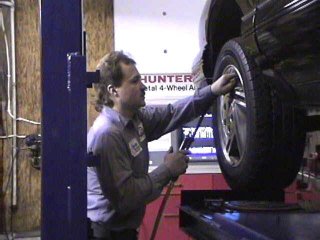 |
Steering pull, unsteady or loose steering
or hard steering can be caused by misalignment conditions.
Correct air pressure in your tires is critical for
alignments, the way your vehicle holds the road in cornering and tire life.
|
|
Maintaining the factory specified suspension setting will
make your car safer and easier to drive.
Suspension springs are responsible for
your vehicles ride height, if they become weak or are sagging, they will
need to be replaced before an alignment can be performed. |
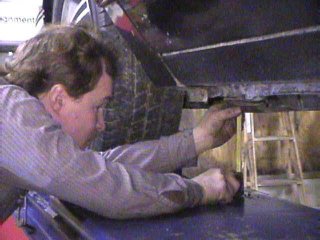 |
|
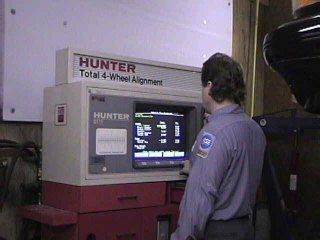 |
Each Manufacturer specifications are
precise settings to achieve the maximum performance from their vehicle.
Vehicle specifications are entered into
the computer |
|
| Whenever you impact a curb or pot hole hard, the alignment
should be checked before unusual tire wear is detected, (edge wear, diagonal
wear, cupping wear) which may result in premature tire replacement!
An electronic gauge is attached &
compensated to each wheel to measure its position. |
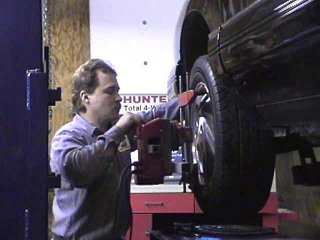 |
|
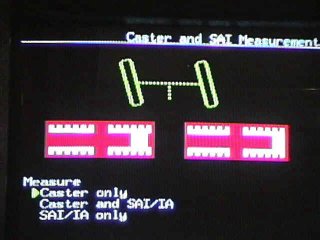 |
A properly aligned vehicle can save you money!
The steering is turned in each
direction to measure caster, steering axis inclination & included angle.
|
|
| Misalignment conditions can cause greatly accelerated tire
wear, poor fuel economy, and excessive wear on other suspension parts.
This initial procedure is to check for bent /damaged parts. |
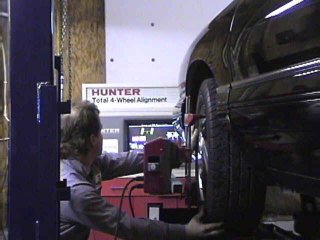 |
|
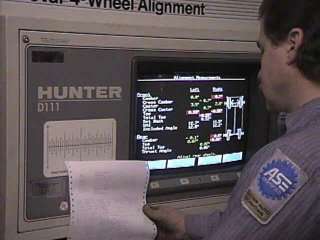 |
Wheel alignments are the specific adjustments made to your
vehicle's suspension to optimize ride, handling and steering
characteristics.
The measurement results are compared to
specs. |
|
|
Some vehicles require all 4 wheels to
be aligned. Rear wheels are sometimes completely removed to install shims to
compensate or to make necessary adjustments. |
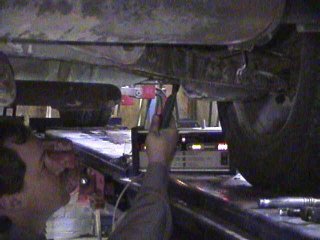 |
|
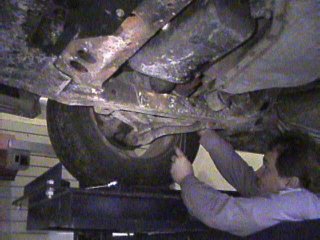 |
The installation of new tires or the replacement of worn
suspension parts should always be accompanied by a wheel alignment to help
protect your tire investment.
Sometimes new parts are required to
restore and maintain proper alignment angles, this is then followed by
accurate adjustments. |
|
| A computerized wheel alignment system
should be used for accurate readings and necessary adjustments made to your
vehicle investment.
Hunter D-111 Wheel Alignment System |
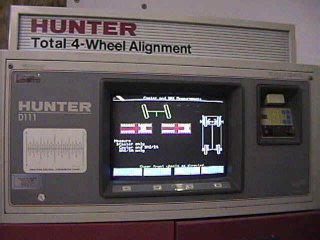 |
|
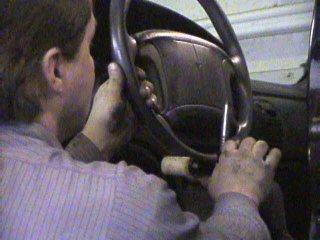 |
Steering or handling problems such as (loose steering,
steering wheel off center or steering changes
direction after hitting bumps), should have the alignment checked as a part
of the diagnostic procedure.
Steering wheel is leveled and locked
for final toe adjustments to assure a straight ahead position. |
|
| Checking the wheel alignment as a part of routine annual
maintenance can significantly increase suspension parts and tire life,
saving you money! |
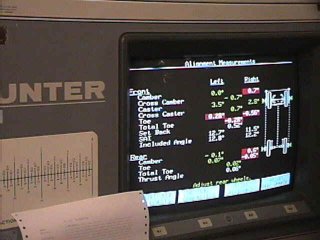 |
|
|
Why Should You Get
Your Wheel Alignment Serviced?
Wheel alignments are the specific
adjustments made to your vehicle's
suspension to optimize ride, handling and
steering characteristics. Each Manufacturer specs are
precise settings to achieve the maximum performance from their vehicle.
Maintaining the factory specified
suspension setting will make your car safer and easier to drive. Steering
pull, unsteady or loose steering, hard steering can be caused by
misalignment conditions. A properly aligned vehicle can save you money!
Misalignment conditions can cause greatly accelerated tire wear, poor fuel
economy, and excessive wear on other suspension or
steering parts.
Whenever you impact a curb or pot
hole hard, the alignment should be checked before unusual tire wear is
detected, (edge wear, diagonal wear, cupping wear) which may result in
premature tire replacement! Steering or handling problems such as (loose
steering, steering wheel off center, steering changes direction after
hitting bumps), should have the alignment checked as a part of the
diagnostic procedure. The installation of new tires or the replacement of
worn suspension parts should always be accompanied by a wheel alignment to
help protect your tire investment. Checking the wheel alignment as a part of
routine annual maintenance can significantly increase suspension parts and
tire life, saving you money!
Click here for About Shocks & Struts
Call
us for an appointment today! |
![]()